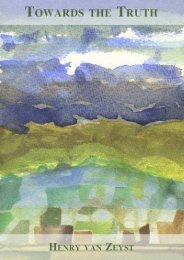Pure Inspiration
Recollections of the great German monk Ven. Ñāṇavimala.
Recollections of the great German monk Ven. Ñāṇavimala.
You also want an ePaper? Increase the reach of your titles
YUMPU automatically turns print PDFs into web optimized ePapers that Google loves.
Chittapala – 109<br />
obstacles will not arise tomorrow. One must continually examine the<br />
mind to see that craving is not arising.<br />
When studying, read the suttas (discourses) and select the most useful<br />
parts for practice. It is not helpful to just read and read because one<br />
tends to forget. Collect useful sections under headings. Study and<br />
recitation are means only and are useful at certain times. Practice is<br />
most important. Study can become just another piyarūpaṁ sātarūpaṁ<br />
(dear and pleasing form), a condition for clinging. Concern with<br />
words can take one in the wrong directions, one may become a scholar.<br />
Going towards the ‘true idea’, one turns away from the ‘sign’. Going to<br />
the sign, one goes away from the ‘true idea’. Recitation is very useful<br />
to combat thīnamiddha (sloth and torpor), a great danger when one is<br />
living alone). Contemplating the dhamma awakens the mind.<br />
Sīla is the basis and should be kept perfectly. If there are occasional<br />
light transgressions of the Pāṭimokkha (major disciplinary rules),<br />
these can be rectified. Pāṭimokkha is only to do with speech and body,<br />
but the ten kammapatha (ways of action) should be kept perfectly.<br />
Mind is most important to look after, because then one’s speech and<br />
bodily actions will fall into line. Don’t let vinaya become a ‘bugbear’.<br />
Differences in practice (between monks) are not so important. If<br />
practice is not clung to and one is firm in it, that is okay.<br />
It is difficult when one is young to go out alone. I wouldn’t advise<br />
cārikā at all because one meets so many things, one is continually<br />
confronted with sense objects. Before setting out, one must be<br />
established in asubhasaññā and aniccasaññā (the perceptions of<br />
unattractiveness and impermanence). On cārikā, one must consider<br />
whether the mind is developing well and whether one is affected by
















